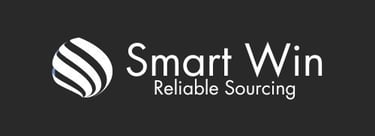[Buyer Beware] Top Tips to Avoid Scams When Importing from China
Avoid scams when importing from China with expert tips on supplier verification, payment security, and quality control. Stay safe with Smart Win's guidance.
2/15/20256 min read
![[Buyer Beware] Top Tips to Avoid Scams When Importing from China](https://assets.zyrosite.com/cdn-cgi/image/format=auto,w=1024,h=535,fit=crop,trim=10.613390928725702;0;19.71058315334773;0/YNqro9jB1VIg6bzd/scam-alert-616-1-AoPqLOVEqocwr97J.webp)
![[Buyer Beware] Top Tips to Avoid Scams When Importing from China](https://assets.zyrosite.com/cdn-cgi/image/format=auto,w=375,h=321,fit=crop,trim=0;204.4969450101833;0;0/YNqro9jB1VIg6bzd/scam-alert-616-1-AoPqLOVEqocwr97J.webp)
When it comes to importing products from China, the appeal is undeniable. With cost-effective prices and a vast range of products, businesses are eager to tap into China’s manufacturing power. However, with the opportunities come significant risks—scams and fraud are common in international trade. According to a report from the Association of Certified Fraud Examiners (ACFE), international trade fraud costs businesses worldwide billions of dollars every year. For those unfamiliar with the nuances of sourcing from China, falling victim to a scam can be a costly mistake.
The goal of this article is to provide practical tips and insights to help you avoid scams when importing from China. By leveraging Smart Win’s expertise, you can ensure a safer, smoother sourcing experience, from identifying fake suppliers to securing payment methods that protect your investments.
Table of Contents
The Most Common Types of Scams When Importing from China
How to Verify the Legitimacy of a Chinese Supplier
Safest Payment Methods to Minimize Risk
Ensuring Product Quality and Avoiding Scams
What to Do if You’re Scammed
The Most Common Types of Scams When Importing from China
Understanding the types of scams in the world of China sourcing is crucial to avoid falling victim to fraud. Let’s break down the most common types:
1.1 The “Bait and Switch” Scam
In this scam, you receive a product that looks different from the sample you approved. This is often a tactic to lure buyers with high-quality samples, only for them to receive a subpar product after payment.
Tip: Always request pre-production samples and verify their quality through third-party inspection. This will give you confidence that the products match your expectations before committing to large orders.
1.2 The “Fake Factory” Scam
Some suppliers in China may not be actual manufacturers, but intermediaries who pretend to have their own factories. These middlemen can significantly raise your costs or deliver inferior quality goods.
Tip: Ensure you verify the factory’s legitimacy by asking for official business licenses and conducting an on-site audit.
1.3 The “Intellectual Property Theft” Scam
Counterfeiting is rampant in global trade, and China is no exception. Many businesses unknowingly deal with suppliers who sell counterfeit versions of branded products or steal your designs.
Tip: Secure Non-Disclosure Agreements (NDAs) and protect your intellectual property through proper registration. Before sharing any designs, ensure you are working with reputable manufacturers.
1.4 Payment Scams
In a typical payment scam, you may be asked to pay upfront in full or wire funds to suspicious accounts. Some scammers ask for unconventional payment methods like Western Union or personal bank transfers, which are difficult to trace.
Tip: Stick to secure payment methods such as Letters of Credit (LC) or Escrow services. These offer an extra layer of protection and reduce the risk of fraud.
How to Verify the Legitimacy of a Chinese Supplier
Due diligence is crucial when working with Chinese suppliers. Here’s how you can ensure your supplier is legitimate:
2.1 Checking Business Licenses and Registration
Before engaging in any business transaction, ensure the supplier is officially registered in China. Chinese authorities maintain records of registered businesses, which you can access to verify their legitimacy.
Tip: You can check these licenses through the official Chinese government website or use third-party verification services to ensure your supplier is compliant with local regulations.
2.2 Conducting Factory Audits
One of the best ways to verify a supplier is through an on-site factory audit. This gives you firsthand insight into the supplier’s capabilities, working conditions, and production standards.
Tip: Smart Win offers factory audit services, so you can be confident that the supplier meets your standards before placing a large order.
2.3 Checking References and Reviews
Reach out to previous clients or ask for references to gauge the supplier’s reputation. While online reviews can be helpful, be cautious, as fake reviews can be common.
Tip: Request specific references from suppliers who have placed similar orders, and cross-check feedback across multiple platforms.
2.4 Using Third-Party Verification Services
Third-party verification services can help you assess the credibility of your supplier. They offer in-depth checks, from financial stability to production quality, ensuring you’re working with a reputable partner.
Safest Payment Methods to Minimize Risk
When importing from China, how you handle payments can make or break your business. Avoid risky methods and opt for more secure alternatives:
3.1 Understanding Letters of Credit (LCs)
A Letter of Credit (LC) is a financial document from a bank that guarantees payment to the supplier, but only after the conditions of the contract are met. It provides both buyers and sellers with confidence that the terms of the deal will be honored.
Tip: LCs are a safer option compared to wire transfers because they reduce the risk of fraud and ensure that funds are only released when the agreed-upon conditions are met.
3.2 Using Escrow Services
Escrow is another payment method that provides protection to both buyers and sellers. The buyer deposits the payment into an escrow account, which is only released when the supplier meets all conditions of the contract.
Tip: Ensure that the escrow service is reputable and trusted in international trade.
3.3 Minimizing Upfront Payments
Never agree to pay for the entire order upfront. Instead, negotiate a smaller deposit and make subsequent payments based on the progress of production or inspection results.
Tip: Most common payment structure involves 30% upfront and the remaining 70% upon shipment.
3.4 Avoiding Unconventional Payment Methods
Avoid paying through untraceable methods like Western Union, MoneyGram, or personal bank transfers. These methods leave little room for recourse if something goes wrong.
Ensuring Product Quality and Avoiding Scams
One of the biggest risks when importing from China is receiving poor-quality products. Here’s how to prevent this from happening:
4.1 The Cost of Poor Quality
Receiving substandard products can damage your brand and reputation, not to mention result in significant financial losses. It’s essential to ensure that your suppliers adhere to quality standards.
4.2 Pre-Production Inspections
Before production begins, request to inspect raw materials and prototypes. This helps identify any potential quality issues before the entire batch is made.
4.3 During Production Inspections
Monitoring the production process can prevent unexpected quality issues. Inspecting products while they’re being made ensures that any discrepancies are caught early on.
4.4 Final Inspections
The final inspection is your last line of defense before shipment. A thorough check of the finished products guarantees that you’re getting exactly what you ordered.
4.5 Setting Clear Quality Standards and Specifications
Be crystal clear about your product specifications and quality standards before production starts. Provide detailed instructions on what’s expected and ensure the supplier understands them.
What to Do if You’re Scammed
Even with the best precautions, sometimes things can go wrong. Here’s what you can do if you fall victim to a scam:
5.1 Understanding International Trade Law
International trade law can be complex. If you find yourself involved in a dispute, you’ll need to understand the legal framework governing your transaction.
Tip: Seek guidance from a legal professional who specializes in international trade and understand your rights and options.
5.2 Reporting the Scam to Relevant Authorities
If you’ve been scammed, report it to the relevant authorities, such as the Chinese government, international trade organizations, or your local embassy.
5.3 Pursuing Legal Action (Challenges and Considerations)
Pursuing legal action in China can be challenging due to differences in legal systems. It’s essential to weigh the costs and benefits before proceeding.
5.4 The Importance of Contracts
Having a solid contract with clear terms and conditions can serve as your safety net. Include dispute resolution clauses that specify how to handle potential conflicts.
Conclusion
The risks of importing from China are real, but with the right precautions, they can be minimized. By verifying suppliers, using secure payment methods, and ensuring quality control, you can avoid scams and safeguard your business. Smart Win is here to help with sourcing, and quality control services, ensuring you get the best products at the best prices, without the risks.
Ready to start sourcing from China with confidence? Contact Smart Win today and let us help you navigate the world of China sourcing safely.
FAQs:
1. How do I handle language and cultural barriers when communicating with Chinese suppliers?
Language and cultural differences can be a challenge in international trade. To overcome this, consider working with a translator or a sourcing agent who understands both languages and business customs. Additionally, using simple, clear language in written communications can minimize the chances of confusion.
2. What are the key differences between a trading company and a manufacturer, and why does it matter?
The key difference is that trading companies often charge higher prices since they act as intermediaries, and they may not always have control over product quality. Working directly with a manufacturer can reduce costs and improve control over the production process. But if you are sourcing a large range of products, in this case a trading company may be helpful, because they can offer you the products you want in one place instead of dealing with several manufacturers. However, verifying whether a supplier is a true manufacturer or a trading company is critical.
3. Is it possible to prevent delivery delays when sourcing from China?
While delays can happen due to unforeseen circumstances like weather, holidays, or shipping backlogs, there are steps you can take to minimize them. Set clear timelines with your supplier and request regular updates on production progress. Additionally, opt for reliable logistics partners and consider shipping via air for faster delivery when necessary.
4. What are the most common mistakes buyers make when negotiating prices with Chinese suppliers?
One of the most common mistakes is focusing solely on the lowest price, which can lead to compromised product quality or hidden costs. It's essential to balance price with quality and the reliability of the supplier. Another mistake is failing to negotiate payment terms or not asking about additional costs such as shipping, tariffs, and customs duties. To ensure a fair deal, it’s important to conduct thorough research, set clear expectations, and consider the overall value rather than just the initial cost.
Our Address
No.202 Huanshi West Rd, Yuexiu District Guangzhou, China
Contact Us
Working hours
Monday - Saturday
9:00 - 18:00
( Beijing Standard Time )
Smart Win Services


Company




